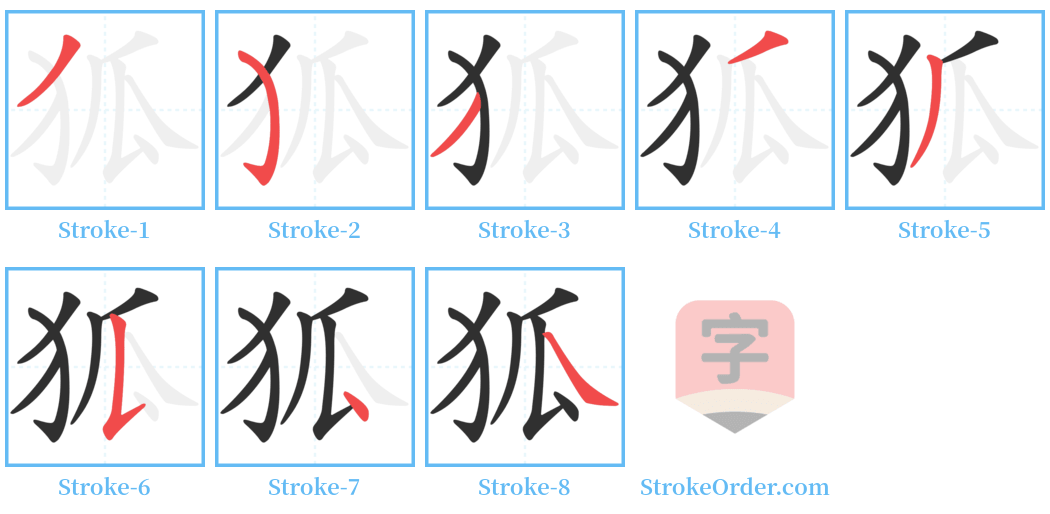狐 Stroke Order
Animated Stroke Order of 狐

Stroke Order Diagrams for 狐

Step-by-Step Handwriting Guide for 狐

Learn to Write Chinese Characters with Video Tutorials
Watch the video of writing the Chinese character "狐", learn the correct stroke order (笔顺) of the character "狐", and master the standard way of writing the character "狐".
Free Printable Handwriting Practice with Stroke Order: 狐
Printable Writing Practice Worksheet of "狐" in Portrait Orientation (Tian Zi Ge)

Printable Writing Practice Worksheet of "狐" in Landscape Orientation (Tian Zi Ge)

Information of 狐
Pinyin
hú
Radical
犭
Strokes
8 strokes
Usage
★★★★★
Definition
fox
狐 [hú]
1. A genus of mammals that resembles a wolf. Its fur is reddish-yellow, and it is cunning and suspicious. When attacked, it releases a foul odor from its anus and escapes. Its skin can be used for clothing (commonly referred to as "fox").
- Example: 狐臭 (fox odor), 狐肷 (the fur of a fox's armpits and belly), 狐疑 (suspicious), 狐媚 (to ingratiate oneself and pander to others), 狐死首丘 (a saying that a fox, when dying, will turn its head towards the hill it was born on, signifying a remembrance of one's roots and nostalgia for one's hometown).
2. A surname.
Etymology: The character is a phonetic compound, combining the radical for “dog” (犬) with a phonetic element (瓜).
Synonyms:
1. The same as the original meaning (fox).
2. A metaphor for bad people, petty individuals.
Citations:
1. From the Book of Han, Emperor Wen's reign: "I am hesitant." Note: "Foxes are inherently suspicious; they will listen while crossing an icy river, hence the term 'hesitant' is called "fox hesitance."
2. From the I Ching: "Small foxes attempt to cross."
3. From the Records of the Grand Historian: "Foxes call out and say."
4. From Tang poet Cen Can: "Fox furs do not warm, while silk blankets are thin."
5. From the Guangdong Military Affairs records: "Fox relies on mice to hide."
Examples:
- 狐丘 (fox den or small hill where foxes dwell)
- 狐白 (the white fur of a fox's armpit)
- 狐兔 (fox and rabbit)
- 狐仙 (a legend that foxes can cultivate themselves into immortals, transforming into human form and interacting with people).
Metaphorically refers to bad people or petty individuals:
- 如: 狐唱枭和 (referring to bad individuals supporting each other)
- 狐狼 (referring to cunning and malicious individuals)
- 狐鼠 (referring to petty individuals or bad people)
- 狐鸣枭噪 (referring to the arrogant behavior of petty individuals)
- 狐禅 (heterodox ideas).
lit. if the rabbit dies, the fox grieves (idiom); fig. to have sympathy with a like-minded person in distress
have all sorts of doubts and conjectures in one's mind / extremely suspicious / filled with suspicion
lit. the fox exploits the tiger's might (idiom); fig. to use powerful connections to intimidate people
lit. fox's tail (idiom); visible sign of evil intentions / to reveal one's evil nature / evidence that reveals the villain
Input Method for 狐
Pinyin
hu2
Wubi
qtry
Cangjie
khhvo
Zhengma
qmps
Four Corner
42230
Unicode
U+72d0
Same Pronunciation Characters